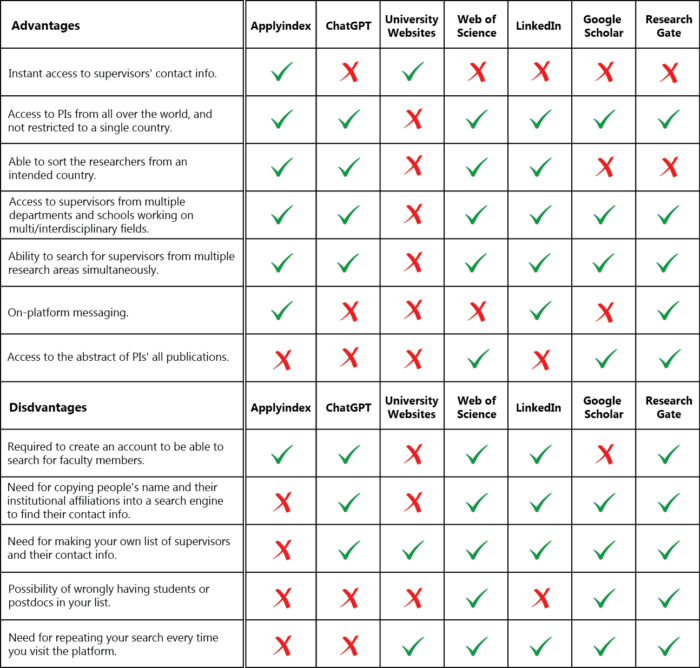
Depending on the type of position you are applying for, you may need to find a supervisor either before or after submitting your formal application. The requirements can vary based on the degree level (undergraduate to postdoctoral positions) and the type of funding, such as self-funded, fully RA-funded, or TA-funded positions. To apply for RA-funded master’s and PhD positions and postdoc grants, you typically need to find a supervisor. In contrast, undergraduate and course-based master’s positions don’t require supervisor engagement in your application. Understanding these differences is key to navigating the application process smoothly and efficiently.
Should You Find a supervisor?
Undergraduate and course-based master’s applicants typically don’t need to find a supervisor for their application process. These programs often have predetermined supervisors or a system for assigning supervisors to students. If you are applying for a self-funded master’s or self-funding a PhD, you don’t need to find a supervisor. In contrast, the applicants who seek fully funded PhD positions might need to approach supervisors.
Depending on the funding type (teaching assistant (TA), research assistantship (RA), and graduate assistantship (GA)) you are seeking, it might be necessary to find a supervisor at a university. TA funding for commencing students is only offered by American and Canadian universities, and supervisors do not play any role through decision-making, so you don’t need to find any supervisor. Conversely, to secure RA funding, you should find and contact professors at universities and research institutions. Note that different terms are used in various countries for RA funding, which is common in the US. For example, it is called scholarship in Australia, and studentship in the UK.
Postdoc positions are classified as academic job positions rather than academic degrees, and you are typically required to apply through the official application forms on universities’ websites. However, reaching out to the supervisor offering the position is highly recommended because building a professional relationship early on can make your application stand out from other candidates. Another scenario is if you plan to apply for postdoctoral grants, such as the Marie Curie postdoctoral or the Banting postdoctoral Fellowships. In this case, you must include a supervisor as a host in your grant application. Therefore, it is essential to contact potential supervisors to find out who is willing to host you.
How to Find a Research Supervisor
“How to find research supervisors”, “how to find a supervisor”, or “how to find a PhD supervisor” are the primary questions for most master’s, PhD, and postdoc applicants. Because research supervisors are the core component of their academic journey. Some traditional ways include using the Web of Science, LinkedIn, Google Scholar, ResearchGate, and university websites. Applyindex aims to remove the traditional pathways for applicants when trying to find a supervisor.
How to Find a Supervisor on Applyindex

Applyindex is a recent entrant in higher education, alongside established platforms like LinkedIn, Google Scholar, FindaPhD, ResearchGate, and others. However, what sets us apart is our commitment to filling the voids left by existing platforms. Our primary objective is to connect applicants with the most suitable research supervisors, facilitating the matching process between master’s, PhD, and postdoctoral candidates worldwide and compatible research supervisors. We strive to make this connection easier and more efficient, moving away from the conventional, tiring, and tedious methods currently in place. We highly recommend reading our article on approaching supervisors for research opportunities using our personalized features.
How to Find a Supervisor Using ChatGPT

ChatGPT is an AI chatbot that was launched in November 2022. Crafting effective prompts is crucial when interacting with ChatGPT to obtain optimal responses. The choice of prompts can lead to diverse answers, which has sparked interest among professionals in the field, emphasizing the significance of prompt engineering. ChatGPT can be a valuable resource for individuals who want to find a supervisor. Here is a guide on how to utilize ChatGPT to conduct a step-by-step search for academic supervisors specializing in polymer chemistry in the USA:
- Begin by visiting the official website of OpenAI at https://chat.openai.com/ and creating an account to access the platform.
- Once logged in, you can initiate a conversation with ChatGPT by composing a prompt.
- For instance, you can use the following prompt as an example: “Please give me a list of 5 polymer chemistry supervisors in the USA”.
- ChatGPT will respond as shown below*:
- Next, utilize a search engine to copy and paste the identified supervisors’ names and institutional affiliations to find their contact details, including email addresses.
- Compile a comprehensive list of supervisors, including their contact information, for future communication and contact purposes.
*Certainly! Here is a list of polymer chemistry supervisors in the United States. These supervisors have expertise in polymer chemistry. Please note that availability and research focus may vary over time. It is recommended to verify the current status and research interests of supervisors by visiting their respective university websites or contacting the departments directly.
1. Professor Krzysztof Matyjaszewski – Carnegie Mellon University
2. Professor Jeremiah A. Johnson – Massachusetts Institute of Technology
3. Professor Craig J. Hawker – University of California, Santa Barbara
4. Professor Heather D. Maynard – University of California, Los Angeles
5. Professor Brent S. Sumerlin – University of Florida
How to Find a Supervisor Using Traditional Ways
Find a Supervisor Using “University Websites”

University websites are a valuable resource and database of research faculty members. You can follow a systematic approach to finding suitable research supervisors from a university website. Below is a detailed guide:
- Begin by visiting the official website of your target university. Conduct a search using the university’s name to easily locate their website.
- Once on the university’s website, navigate to the department or faculty page that corresponds to your research area. For instance, if you have an interest in computer science, proceed to the Computer Science department page.
- Look for a faculty or staff section or tab on the department page. This is where you can access information about the professors or supervisors associated with that department.
- Afterward, explore the faculty or staff page to find a list of professors, along with their academic titles and areas of expertise. Typically, professors are presented with their names, academic designations, and research interests.
- Pay attention to the research interests or areas of expertise mentioned alongside each professor’s name. This will assist you in identifying supervisors who specialize in your research area or share similar interests.
- Next, click on the profile or biography of the professors you are interested in. This will provide you with more comprehensive details about their research background, publications, and projects, as well as any additional qualifications or achievements.
- While perusing the professor’s profile, make note of their contact information, such as their email address or office phone number. These details will be valuable for future communication.
- Repeat the aforementioned steps for other departments or faculties if you are exploring interdisciplinary research areas or have multiple research interests.
- Eventually, create a shortlist of supervisors who align with your research interests based on their expertise and research areas.
Find a Supervisor Using “Web of Science”

The Web of Science is a platform that grants entry to numerous databases containing citation and reference information from scholarly journals, conference proceedings, and other academic documents across various disciplines. Initially created by the Institute for Scientific Information, we will guide you on how to find a supervisor on the Web of Science through the following steps:
- Visit Web of Science and create an account if needed.
- Log in and go to the search bar or main search page.
- Select “Topic” under the “DOCUMENTS” tab.
- Specify your search query for desired research publications.
- Refine results using filters like location, institution, research focus, or publication year to find relevant principal investigators (PIs).
- Next, click “Analyze Results” after getting the search results.
- Change “Web of Science Categories” to “Authors” to see a ranked list of authors based on publication count.
- Click an author’s name to view their publications.
- Access profiles of selected authors and co-authors.
- Note their contact information from profiles, including email addresses and affiliations.
- Alternatively, search their names and affiliations online to find contact details, such as email addresses, for reaching out to potential supervisors.
- Finally, compile a shortlist of compatible supervisors, focusing on PIs at universities or research institutes. (Note: Exclude students or postdocs from the shortlist.)
How to Find a Supervisor Using “LinkedIn”

LinkedIn is more like a social media platform, primarily focusing on professional networks, connections, companies, and academic institutions. You can utilize a systematic approach to find a supervisor on LinkedIn for your journey as a master’s student, PhD candidate, or postdoc researcher. Here is a comprehensive guide:
- Sign in or create a LinkedIn account.
- Visit the LinkedIn homepage after logging in.
- Use relevant keywords in the search bar to find your research area or field of interest.
- Afterward, click on the “People” tab to filter the search for individuals.
- Refine your search with additional filters like location, industry, connections, and current company/institution.
- Review profiles of individuals matching your research interests, noting their background, education, experience, and research-related information.
- Look for indicators such as publications, research projects, or collaborations in your field of interest.
- Read their LinkedIn profiles for more details on research expertise, publications, and achievements. Note down contact information if available.
- Finally, connect with potential supervisors on LinkedIn, sending a personalized message expressing your interest.
- Alternatively, collect contact information and reach out via email or preferred method. Create a shortlist of compatible supervisors for your research goals.
How to Find a Supervisor Using “Google Scholar”

Google Scholar is a research- and publication-relevant platform managed by Google LLC. It provides a thorough updated database of original research papers, communications, review articles, books, book chapters, patents, and so on. To find relevant supervisors through Google Scholar, applicants can go through the following step-by-step process:
- Go to the website https://scholar.google.com and enter your research interest(s) in the search bar.
- The search results will display a list of publications related to your research interest(s).
- In the list of authors, those with an underline indicate that they have a Google Scholar account. Clicking on their names will allow you to access their profiles.
- Take note of their names and institutional affiliations. You can then use a search engine to find their contact information, such as email addresses.
- Create a list of research supervisors and their contact information who share your research objectives and interests. It is important to focus specifically on PIs affiliated with universities or research institutes, excluding students or postdoctoral researchers.
- If you click on a specific research area on a profile, you will be presented with a comprehensive list of researchers worldwide working in that field.
Find a Supervisor Using “ResearchGate”

ResearchGate is an online platform for scientists, researchers, and academics to share and access scientific publications, collaborate, and showcase their work. It provides a centralized hub for interdisciplinary knowledge exchange, allowing users to create profiles, upload publications, and engage in discussions and collaborations. With a user-friendly interface and diverse tools, ResearchGate aims to foster scientific progress and build a global research community. Let’s walk you through how to find PhD supervisors on ResearchGate:
- If you don’t have an account, create one by following the registration process.
- Once logged in, use the search bar or navigate to the main search page.
- Specify your search query to find PhD supervisors in your desired academic discipline or field.
- Explore the search results and review the profiles of potential research supervisors. Pay attention to their expertise, research interests, publication records, and affiliations.
- Read the abstracts or summaries of a few of their publications to gain insights into their research areas and methodologies. This will help you evaluate if their expertise aligns with your research interests.
- To obtain the contact details, including email addresses, of the identified supervisors and their institutional affiliations, you can employ a search engine and simply copy and paste their names.
- Eventually, consider creating a shortlist of supervisors who seem compatible with your research goals and interests.
- Alternatively, utilize the “Message” feature to send a well-crafted message introducing yourself, expressing your interest in their research, and inquiring about potential research opportunities under their guidance. Personalize each message to demonstrate your knowledge of their work and explain why you believe they would be a suitable research supervisor for you.
Conclusion – Find a Supervisor
In conclusion, whether you are applying for master’s, PhD, or postdoctoral positions, understanding the role of supervisors in the application process is crucial to securing your desired academic position. Each pathway (self-funded, fully funded, or TA/RA-funded) comes with its own set of requirements regarding supervisor engagement. Ensuring you know when and how to find a supervisor can streamline your application process and boost your chances of success. Below is a comprehensive comparison of the advantages and disadvantages of each platform discussed throughout this article, as they relate to finding a supervisor. As you can observe, Applyindex emerges as the superior option among the available pathways.

Frequently Asked Questions (FAQs)
Do I need to find a supervisor before applying to a university program?
It depends on the program type and funding. For research-based and RA-funded master’s, PhD, and postdoc positions, yes, you usually need to contact a supervisor in advance. For course-based master’s and undergraduate programs, you typically don’t.
What is the difference between TA and RA funding in terms of supervisor involvement?
TA funding doesn’t require supervisor approval and is mainly offered in the US and Canada. RA funding does require finding and contacting a supervisor who has financing available for your project.
What are the best tools to find a supervisor?
You can use university websites, Web of Science, LinkedIn, Google Scholar, and ResearchGate. Platforms like Applyindex and ChatGPT also provide personalized and efficient supervisor search options.



0 Comment